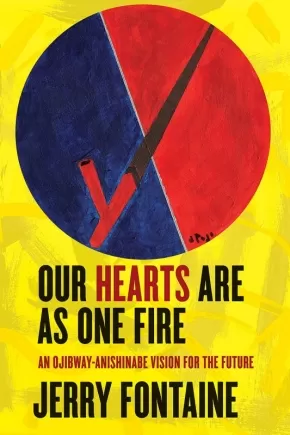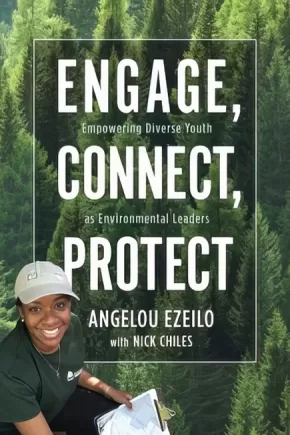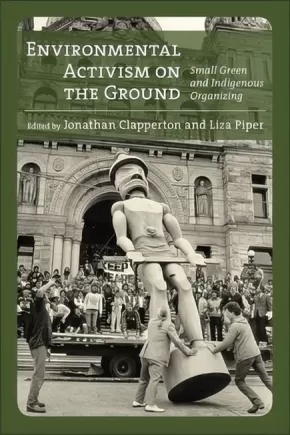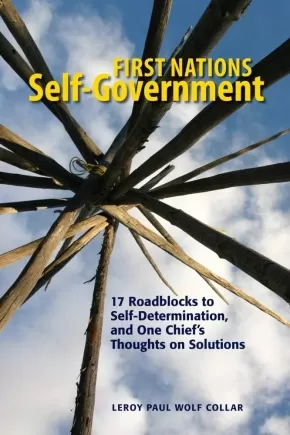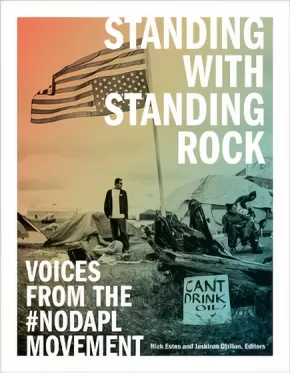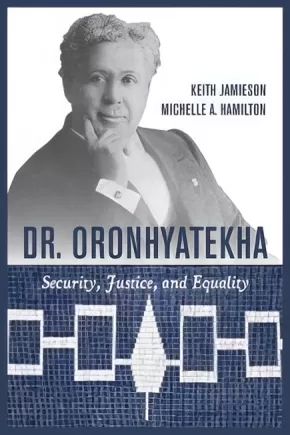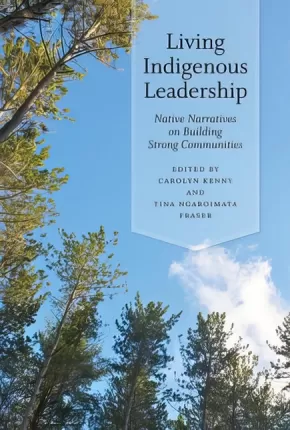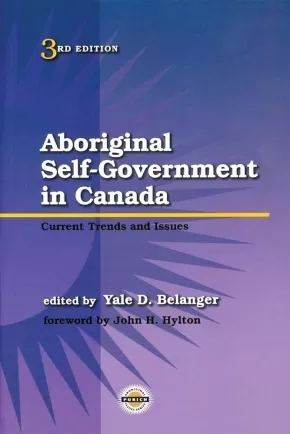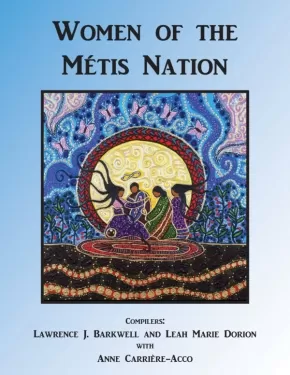Leadership
Synopsis:
A vision shared. A manifesto. This remarkable work argues that Anishinabeg need to reconnect with non-colonized modes of thinking, social organization, and decision making in order to achieve genuine sovereignty. In Our Hearts Are as One Fire, Jerry Fontaine recounts the stories of three Ota’wa, Shawnee, and Ojibway-Anishinabe leaders who challenged aggressive colonial expansion – Obwandiac, Tecumtha, and Shingwauk. He weaves Ojibwaymowin language and knowledge with conversations with elders and descendants of the three leaders. The result is a book that reframes the history of Manitou Aki, sharing a vision of how Anishinabe spiritual, cultural, legal, and political principles will support the leaders of today and tomorrow.
Reviews
"A critically important manifesto written by an Anishinabe leader. Every First Nations leader in North America must read Our Hearts Are as One Fire. It is the book we have all been waiting for." — Matthew L.M. Fletcher, director of the Indigenous Law and Policy Center, Michigan State University
"makwa ogimaa presents an intimate story of Anishinabe traditional leadership, one that reflects the place of “an ethics of relationship” that is so urgently needed as we search for paradigms of leadership that once again connect us to each other and to the Earth."— Gregory A. Cajete, professor of Native American Studies and Education, University of New Mexico
Educator Information
Table of Contents
Foreword / Lee Anne Cameron
Ah-di-so-kay Anishinabeg / Traditional Storytellers
Maaitaa / Prologue
Nitam igo / Introduction
1 Gah-o-mah-mah-wahn-dah-wi-zid gah-ki-nah-gay-goo ji-gi-kayn-dah-so aki / A prophet is someone who has a completed view of the world
2 Obwandiac / The Man who Travelled and Stopped at Many Places
3 Tecumtha / He Walked Across
4 Shingwauk / The White Pine, Boss of All the Trees
5 N’swi-ish-ko-day-kawn Anishinabeg O’dish-ko-day-kawn / Our Hearts Are as One Fire
6 Meegwetch bi-zhin-dah-wi-yeg / Thank you for listening to me
Wayekwaase / It is finished
Appendix
Timeline
Glossary; Notes; Index
Additional Information
280 pages | 5.50" x 8.50"
Synopsis:
Building environmental strength through a diversity of youth.
While concern about the state of our land, air, and water continues to grow, there is widespread belief that environmental issues are primarily of interest to wealthy white communities. Engage, Connect, Protect explodes this myth, revealing the deep and abiding interest that African American, Latino, and Native American communities – many of whom live in degraded and polluted parts of the country – have in our collective environment.
Part eye-opening critique of the cultural divide in environmentalism, part biography of a leading social entrepreneur, and part practical toolkit for engaging diverse youth, Engage, Connect, Protect covers:
- Why communities of color are largely unrecognized in the environmental movement
- Bridging the cultural divide and activate a new generation of environmental stewards
- A curriculum for engaging diverse youth and young adults through culturally appropriate methods and activities
- A resource guide for connecting mainstream America to organizations working with diverse youth within environmental projects, training, and employment.
Engage, Connect, Protect is a wake-up call for businesses, activists, educators, and policymakers to recognize the work of grassroots activists in diverse communities and create opportunities for engaging with diverse youth as the next generation of environmental stewards.
Educator Information
While this work has a US focus, it is still extremely relevant in other countries like Canada.
Additional Information
256 pages | 6.00" x 9.00"
Synopsis:
Environmental Activism on the Ground draws upon a wide range of interdisciplinary scholarship to examine small scale, local environmental activism, paying particular attention to Indigenous experiences. It illuminates the questions that are central to the ongoing evolution of the environmental movement while reappraising the history and character of late twentieth and early twenty-first environmentalism in Canada, the United States, and beyond.
This collection considers the different ways in which Indigenous and non-Indigenous activists have worked to achieve significant change. It examines attempts to resist exploitative and damaging resource developments, and the establishment of parks, heritage sites, and protected areas that recognize the indivisibility of cultural and natural resources. It pays special attention to the thriving environmentalism of the 1960s through the 1980s, an era which saw the rise of major organizations such as Greenpeace along with the flourishing of local and community-based environmental activism.
Environmental Activism on the Ground emphasizes the effects of local and Indigenous activism, offering lessons and directions from the ground up. It demonstrates that the modern environmental movement has been as much a small-scale, ordinary activity as a large-scale, elite one.
Reviews
"Environmental Activism on the Ground succeeds splendidly in complicating and enriching our understanding of modern environmentalism. Focusing on Indigenous and non-Indigenous activists in an impressive range of settings, Jonathan Clapperton and Liza Piper draw together and interpret diverse methodological and conceptual insights in a way that gives new, deserved prominence to those who have strived—and continue to strive—for environmental justice at the local level. These accounts left me both enlightened and heartened. Scholars from across the humanities and social sciences will welcome this volume." - Richard A. Rajala, Department of History, University of Victoria.
Educator Information
Table of Contents:
Illustrations
Acknowledgments
Introduction: In the Shadow of the Green Giants: Environmentalism and Civic Engagements - Jonathan Clappeton & Liza Piper
Part 1: Processes and Possibilities
1. Strategies for Survival: First Nations Encounters with Environmentalism - Anna J. Willow
2. Native/Non-Native Alliances: Challenging Fossil Fuel Industry Shipping at Pacific Northwest Ports - Zoltán Grossman
3. Conserving Contested Ground: Soverigenty-Driven Stewardship by the White Mountain Apache Tribe and the Fort Apache Heritage Foundation - Jon R. Welch
4. From Southern Alberta to Northern Brazil: Indigenous Conservation and the Preservation of Cultural Resources - Sterling Evans
5. Parks For and By the People: Acknowledging Ordinary People in the Formation, Protection, and Use of State and Provincial Parks - Jesica M. DeWitt
Part 2: Histories
6. Alternatives: Environmental and Indigenous Activism in the 1970s - Liza Piper
7. Marmion Lake Generating Station: Another Northern Scandal? - Tobasonakwut Peter Kinew
8. Environmental Activism as Anti-Conquest: The Nuu-chah-nulth and Environmentalists in the Contact Zone of Clayoquont Sound - Jonathan Clapperton
9. Local Economic Independence as Environmentalism: Nova Scotia in the 1970s - Mark Leeming
10. “Not an Easy Thing to Implement”: The Conservation Council of New Brunswick and Environmental Organization in a Resource-Dependent Province, 1969-1983 - Mark J. McLaughlin
11. The Ebb and Flow of Local Environmental Activism: The Society for Pollution and Environmental Control (SPEC), British Columbia - Jonathan Clapperton
12: From Scoieal Movement to Environmental Behemoth: How Greenpeace Got Big - Frank Zelko
Afterword: Lessons from the Ground Up - Jonathan Clapperton & Liza Piper
Bibliography
List of Contributors
Index
Additional Information
752 pages | 6.00" x 9.00"
Authenticity Note: Because this work includes contributions from Indigenous peoples, it has been labelled as containing Authentic Indigenous Text.
Synopsis:
Indigenous Peoples in Canada are continuing to assert their right to self-determination in this era of reconciliation. While dozens of Indigenous communities have signed varying forms of self-government agreements with the federal government, Indigenous Nations still face many obstacles along the path to true self-determination.
As a former Chief of Siksika Nation in southern Alberta, Leroy Wolf Collar dealt with many of the same problems other Indigenous Nations face across the country. From serious housing shortages to the lack of opportunities for youth, Chief Wolf Collar experienced the challenges and frustrations that come from operating in a colonial system still constrained by the Indian Act.
How do Indigenous Peoples move on from this defective system? Chief Wolf Collar identifies 17 issues that currently hinder Indigenous Nations—including broken treaty promises, problems with common forms of band administration, and the intrusion of provincial governments—along with potential solutions to overcome them.
This guide is for current and aspiring Indigenous leaders who want to increase their understanding of good governance, management, and leadership, as well as those who want to explore issues around Indigenous self-determination in Canada.
Educator Information
Recommended in the Canadian Indigenous Books for Schools 2020/2021 resource list for grades 11 and 12 for use in these areas: Law, English Language Arts, and Social Studies.
Additional Information
128 pages | 6.00" x 9.00"
Synopsis:
Dispatches of radical political engagement from people taking a stand against the Dakota Access Pipeline.
It is prophecy. A Black Snake will spread itself across the land, bringing destruction while uniting Indigenous nations. The Dakota Access Pipeline is the Black Snake, crossing the Missouri River north of the Standing Rock Indian Reservation. The oil pipeline united communities along its path—from North Dakota, South Dakota, Iowa, and Illinois—and galvanized a twenty-first-century Indigenous resistance movement marching under the banner Mni Wiconi—Water Is Life! Standing Rock youth issued a call, and millions around the world and thousands of Water Protectors from more than three hundred Native nations answered. Amid the movement to protect the land and the water that millions depend on for life, the Oceti Sakowin (the Dakota, Nakota, and Lakota people) reunited. A nation was reborn with renewed power to protect the environment and support Indigenous grassroots education and organizing. This book assembles the multitude of voices of writers, thinkers, artists, and activists from that movement.
Through poetry and prose, essays, photography, interviews, and polemical interventions, the contributors, including leaders of the Standing Rock movement, reflect on Indigenous history and politics and on the movement’s significance. Their work challenges our understanding of colonial history not simply as “lessons learned” but as essential guideposts for current and future activism.
Contributors: Dave Archambault II, Natalie Avalos, Vanessa Bowen, Alleen Brown, Kevin Bruyneel, Tomoki Mari Birkett, Troy Cochrane, Michelle L. Cook, Deborah Cowen, Andrew Curley, Martin Danyluk, Jaskiran Dhillon, Roxanne Dunbar-Ortiz, Liz Ellis, Nick Estes, Marcella Gilbert, Sandy Grande, Craig Howe, Elise Hunchuck, Michelle Latimer, Layli Long Soldier, David Uahikeaikalei‘ohu Maile, Jason Mancini, Sarah Sunshine Manning, Katie Mazer, Teresa Montoya, Chris Newell, The NYC Stands with Standing Rock Collective, Jeffrey Ostler, Will Parrish, Shiri Pasternak, endawnis Spears, Alice Speri, Anne Spice, Kim TallBear, Mark L. Tilsen, Edward Valandra, Joel Waters, Tyler Young.
Reviews
"As our songs and prayers echo across the prairie, we need the public to see that in standing up for our rights, we do so on behalf of the millions of Americans who will be affected by this pipeline."—David Archambault II, from the interior
"There is no alternative to water. There is no alternative to this Earth. This fight has become my life, and it’s not over. I think this is only the beginning for me, for all of us. Do you want a future for your children and grandchildren? If you want them to have a future then stand with Standing Rock because this is just the beginning of a revolution."—Zaysha Grinnell, from the interior
"We will put our best warriors in the front. We are the vanguard. We are the Hunkpapa Lakota. That means the horn of the buffalo. That’s who we are. We are protectors of our nation of Oceti Sakowin, the Seven Council Fires. Know who we are."—Phyllis Young
Additional Information
448 pages | 7.00" x 9.00"
Synopsis:
A man of two cultures in an era where his only choices were to be a trailblazer or get left by the wayside.
Dr. Oronhyatekha (“Burning Sky”), born in the Mohawk nation on the Six Nations of the Grand River territory in 1841, led an extraordinary life, rising to prominence in medicine, sports, politics, fraternalism, and business. He was one of the first Indigenous physicians in Canada, the first to attend Oxford University, a Grand River representative to the Prince of Wales during the 1860 royal tour, a Wimbledon rifle champion, the chairman of the Grand General Indian Council of Ontario, and Grand Templar of the International Order of Good Templars. He counted among his friends some of the most powerful people of the day, including John A. Macdonald and Theodore Roosevelt. He successfully challenged the racial criteria of the Independent Order of Foresters to become its first non-white member and ultimately its supreme chief ranger.
At a time when First Nations peoples struggled under assimilative government policy and society’s racial assumptions, his achievements were remarkable.
Oronhyatekha was raised among a people who espoused security, justice, and equality as their creed. He was also raised in a Victorian society guided by God, honour, and duty. He successfully interwove these messages throughout his life, and lived as a man of significant accomplishments in both worlds.
Awards
2016 Ontario Historical Society Joseph Brant Award winner
2017 Speaker's Book Award short-listed
Review
With their detailed biography of this giant of Canadian history, Jamieson and Hamilton have done an enormous favour both for aboriginals and non-aboriginals living on this piece of geography currently known as Canada.
— Tworowtimes
Key Points
- A comprehensive biography of Dr. Oronhyatekha, Canada’s first Indigenous physician, and an influential First Nations statesman.
- Covers his friendships with Teddy Roosevelt and John A. Macdonald and his international business.
- He was the first non-White member of the Independent Order of Foresters (IOF), a fraternally organized life-insurance company, having successfully challenged the race criteria for membership.
- As CEO of the IOF, he transformed it from a near-bankrupt, legally embattled organization to a financially stable international company.
- Ahead of his time, Oronhyatekha attempted to broaden the mandate of the IOF so that women and French-Canadians could belong.
- Also details the political, social, and historical context of the Six Nations of the Grand River community in the mid-nineteenth century.
Additional Information
368 pages | 6.00" x 9.00" | b&w and colour illustrations | notes, index, bibliography
Synopsis:
Indigenous scholars strive to produce accessible research grounded in the daily lives of Native peoples, research that will improve their communities in meaningful and sustained ways. They also recognize that long-lasting change depends on effective leadership.
Living Indigenous Leadership showcases innovative research and leadership practices from diverse nations and tribes in Canada, the United States, and New Zealand. The contributors use vibrant stories and personal narratives to offer insights into the unique nature of Indigenous leadership. These dynamic case studies reveal that Native leaders, whether formal or informal, ground their work in embodied concepts such as land, story, ancestors, and elders, concepts rarely mentioned in mainstream studies of leadership. Indigenous leadership, they show, finds its most powerful expression in collaboration, in the teaching and example of Elders, and in community projects to promote higher education, language revitalization, health care, and the preservation of Indigenous arts.
This collection not only adds Indigenous methods to studies on leadership, it also gives a voice to the wives, mothers, and grandmothers who are using their knowledge to mend hearts and minds and to build strong communities. Their personal stories and collective knowledge will inspire further research and future generations.
Synopsis:
Building on the success of the first two editions, this volume briefly recaps the historical development and public acceptance of the concept of Aboriginal self-government, then proceeds to examine its theoretical underpinnings, the state of Aboriginal self-government in Canada today, and the many practical issues surrounding implementation. Topics addressed include: justice innovations, initiatives in health and education to grant greater Aboriginal control, financing and intergovernmental relations, Aboriginal-municipal government relations, developing effective Aboriginal leadership, Métis self government aspirations, the intersection of women’s rights and self-government, and international perspectives. Various self-government arrangements already in existence are examined including the establishment of Nunavut, the James Bay Agreement, Treaty Land Entitlement settlements, the Alberta Métis settlements, and many other land claims settlements that have granted Aboriginal communities greater control over their affairs.
This book is an interdisciplinary guide for practitioners, policy makers, and students interested in learning about government policy and the aspirations of Canada’s Aboriginal peoples. With the exception of three updated chapters, all of the material by the 31 contributors in this volume is new and original. Brief biographies of the contributors can be found on our web site.
Contributors Include:
Yale Belanger is an assistant professor of Native American Studies at the University of Lethbridge where he divides his time as the department’s history and politics specialist while also teaching in the First Nations Governance Program in the Management Department. He is the author of Gambling with the Future: The Evolution of Aboriginal Gaming in Canada (Purich Publishing, 2006).
Frances Abele teaches in the School of Public Policy and Administration at Carleton University. She publishes in the areas of northern and Indigenous affairs, and has worked with Indigenous governments and organizations for the last three decades.
Yvon Allard is an independent Aboriginal health consultant in Ottawa. As a member of the Manitoba Métis community, he has served as an advisor on health issues to regional and national Métis organizations.
Colette Arcand is a fourth-year student majoring in Native Studies with a minor in Economics. Colette is a member of the Alexander First Nation in Alberta and a volunteer board member of the Friends of the Kipohtakaw Historical Foundation.
Catherine Bell is a professor of law at the University of Alberta specializing in Aboriginal legal issues, property law, community based legal research, and dispute resolution. She has published extensively on Métis and First Nation legal issues including two books on the Métis settlements: Alberta’s Métis Settlement Legislation: An Overview of Ownership and Management of Settlement Lands and Contemporary Métis Justice: The Settlement Way.
Brian Calliou is the program director for The Banff Centre’s Aboriginal Leadership and Management. Brian is a member of the Sucker Creek First Nation in north central Alberta and holds memberships with the Canadian Bar Association, the Indigenous Bar Association, and the Legal Archives Society of Alberta.
Angela Cameron is a Ph.D. candidate at the Faculty of Law, University of Victoria. Her areas of research and writing include: restorative justice, criminal law, intimate violence, reproductive technologies, property law, and feminist legal theory.
Larry Chartrand is an Associate Professor of Law at the University of Ottawa. His area of scholarship is in the field of Aboriginal rights and in particular, Métis rights. He obtained his B.Ed. from the University of Alberta in 1986, his LL.B from York University in 1989, and his LL.M. from Queen’s University in 2001. He was Director of the Aboriginal Governance Program and Professor of Politics at the University of Winnipeg from 2004 - 2007.
Ken Coates is Professor of History and Dean, Faculty of Arts, University of Waterloo. He specializes in the history of the Canadian North, Indigenous-newcomers relations and contemporary Aboriginal political issues. His most recent work is A Global History of Indigenous Peoples: Struggle and Survival.
Jo-Anne Fiske is Dean of Graduate Studies and professor of Women’s Studies at the University of Lethbridge. She has worked with Aboriginal and First Nations communities on social policy, health policy, human rights, and homelessness.
Augie Fleras is associate professor of sociology at the University of Waterloo. He is the author of numerous books, including Social Problems in Canada (Third Edition) and Unequal Relations (Third Edition; with Jean Elliott) and Recalling Aotearoa(with Paul Spoonley).
Jim Frideres is currently a professor of Sociology and the Director of the International Indigenous Studies program at the University of Calgary. He also holds the Chair of Ethnic Studies. He is the author of numerous articles and co-author with Rene Gadacz of Aboriginal Peoples in Canada, now in its 8th edition.
Joe Garcea is a professor in the Department of Political Studies at the University of Saskatchewan, where he teaches local government, public administration, and public policy analysis. His areas of expertise include municipal and intergovernmental relations. He co-authored with F. Laurie Barron Urban Indian Reserves: Forging New Relationships in Saskatchewan (Purich Publishing, 1999).
Ailsa Henderson is assistant professor in the Political Science at the University of Toronto. The author of Nunavut: Rethinking Political Culture (UBC Press, 2007), she has published two books and more than twenty-five journal articles or book chapters on sub-state political culture in federal and multi-national states, and is the principal investigator of the Nunavut Social Attitudes Survey.
James (Sa'ke'j) Youngblood Henderson is the research director of the Native Law Centre of Canada and teaches Aboriginal law at the College of Law, University of Saskatchewan. He was awarded the Indigenous Peoples’ Counsel (2005) and the National Aboriginal Achievement Award for Law and Justice (2006).
John Hylton has served as a chief executive, university educator, senior public servant, and consultant. He has served many commissions and inquiries in all parts of Canada, including the Royal Commission on Aboriginal Peoples and the Ipperwash Inquiry. He is currently active working with organizations to improve strategy, leadership, governance and performance. John was the editor of the first two editions of Aboriginal Self-Government in Canada (Purich Publishing, 1994, 1999).
Robert Alexander Innes is a Member of Cowessess First Nation and an Assistant Professor in the Department of Native Studies at the University of Saskatchewan.
Josee Lavoie is an assistant professor in the Health Sciences Program at the University of Northern British Columbia who previously spent 10 years working for Indigenous controlled primary health care services in Nunavut and northern Saskatchewan.
Roger Maaka, Ngati Kahungunu, is head of the Department of Native Studies at the University of Saskatchewan. He sits on the Waitangi Tribunal enquiry into the Indigenous Flora and Fauna and Intellectual Property claim. His research interests include urbanization and Indigenous peoples, Native Studies as an academic discipline, post-treaty settlement development, the construction of contemporary indigenous identities, and indigeneity as a global social movement.
W.R. Morrison is Professor of History, University of Northern British Columbia. He works on aspects of northern Canada history and is currently working with Ken Coates on a survey history of major Canadian court cases.
Bradford W. Morse is Professor of Law, University of Ottawa. He was Research Director to the Aboriginal Justice Inquiry of Manitoba 1988-91; Chief of Staff to Minister of INAC 1993-96; legal advisor, consultant, and negotiator for many First Nations, national and regional Indigenous organizations, royal commissions, and governments in Canada, Australia, and New Zealand over the past 30 years.
Val Napoleon is a member of the Saulteau First Nation in northeastern British Columbia and is of Cree and Dunnezah heritage. She worked as a community activist and consultant in northwestern B.C. for over twenty-five years. Since 2005, Val has been an assistant professor with the University of Alberta teaching in the Faculties of Law and Native Studies.
David Newhouse is Onondaga from the Six Nations of the Grand River community near Brantford, Ontario. He is the first Principal of the Peter Gzowski College at Trent University and former Chair of the Department of Native Studies. He is an Associate Professor in the Department of Native Studies and the Business Administration Program.
John O’Neil is Dean of Health Sciences at Simon Fraser University. He has published more than 120 papers and reports on a variety of Aboriginal health issues, including self-government and health system development, cultural understandings of environmental health risks, and social determinants of health disparities.
Terrence Ross Pelletier is former Chief of Cowessess First Nation and served as the Treaty Land Entitlement Coordinator for Cowessess during the band’s TLE process. He is currently pursuing a Masters in Educational Administration at the University of Saskatchewan.
Michael Prince is Lansdowne Professor of Social Policy at the University of Victoria. Among his areas of research, he has collaborated with Frances Abele on numerous publications dealing with Aboriginal [Indigenous] government and Canadian federalism.
Jeff Reading is a professor in the Faculty of Human and Social Development and a faculty associate with the Indigenous Governance Program at the University of Victoria. He is Fellow of the Canadian Academy of Health Sciences and his research has brought attention to issues such as disease prevention, tobacco use and misuse, and diabetes among Aboriginal people in Canada.
Jean-Paul Restoule is assistant professor of Aboriginal Education in the Department of Adult Education and Counselling Psychology at the Ontario Institute for Studies in Education of the University of Toronto. He is a member of the Dokis First Nation.
Harold Robinson is a member of the Métis Settlements General Council located in Edmonton, Alberta.
Dahti Scott is currently studying at the University of Alberta where she is completing an undergraduate double major in Environmental Conservation Sciences and Native Studies. Dahti is a Tlicho Dene who grew up in the Northwest Territories.
Gabrielle Slowey is an Assistant Professor in the Department of Political Science at York University (Toronto) where she teaches courses in Aboriginal Politics. Her research focuses on issues of self-government, land claims, and non-renewable resource development. Field sites include northern Alberta, Yukon, NWT, James Bay and New Zealand.
Authenticity Note: Because of the contributions from Indigenous peoples to this work, it has been labelled as containing Authentic Indigenous Text.
Synopsis:
Métis Women are the heart and soul of the Métis people. Without them, there would be no Métis Nation. They are the strength behind our families, communities, and places of work. In the past, their kinship networks established where people settled and whom people married. Sovereign within their familial and community roles, they were the healers, the stewards of the land and its resources, the keepers of Indigenous knowledge, and the midwives who kept the Métis Nation nurtured, educated, and sustained. This tradition has continued into the present as Métis women have moved past their domestic and familial spheres into areas such as social advocacy, the arts, sports, law, post-secondary education, and entrepreneurship. Containing hundreds of biographies, Women of the Métis Nation is an ambitious role model book that documents more than 200 years of trailblazing Métis women.
Additional Information
235 Pages | Nonfiction

